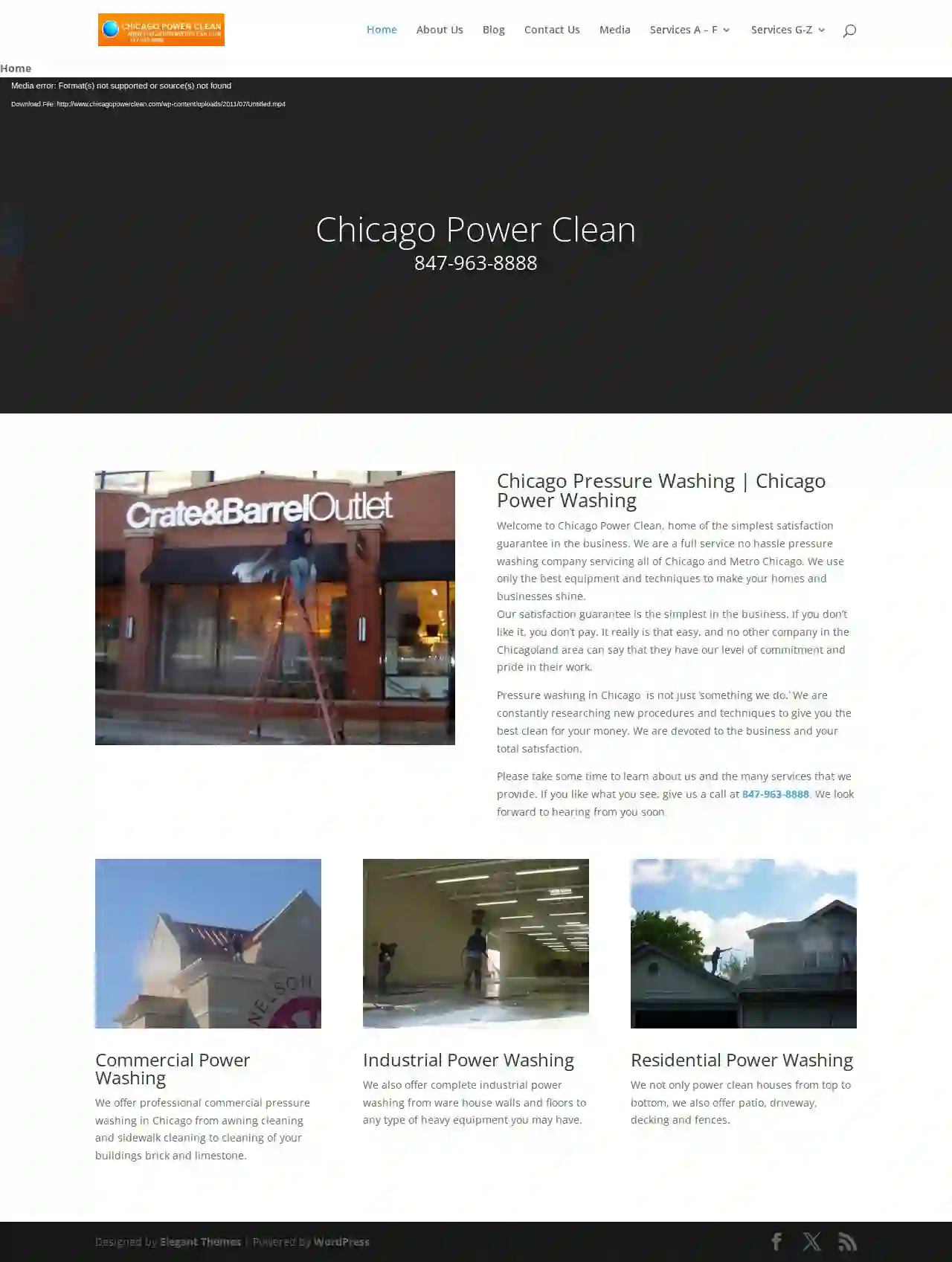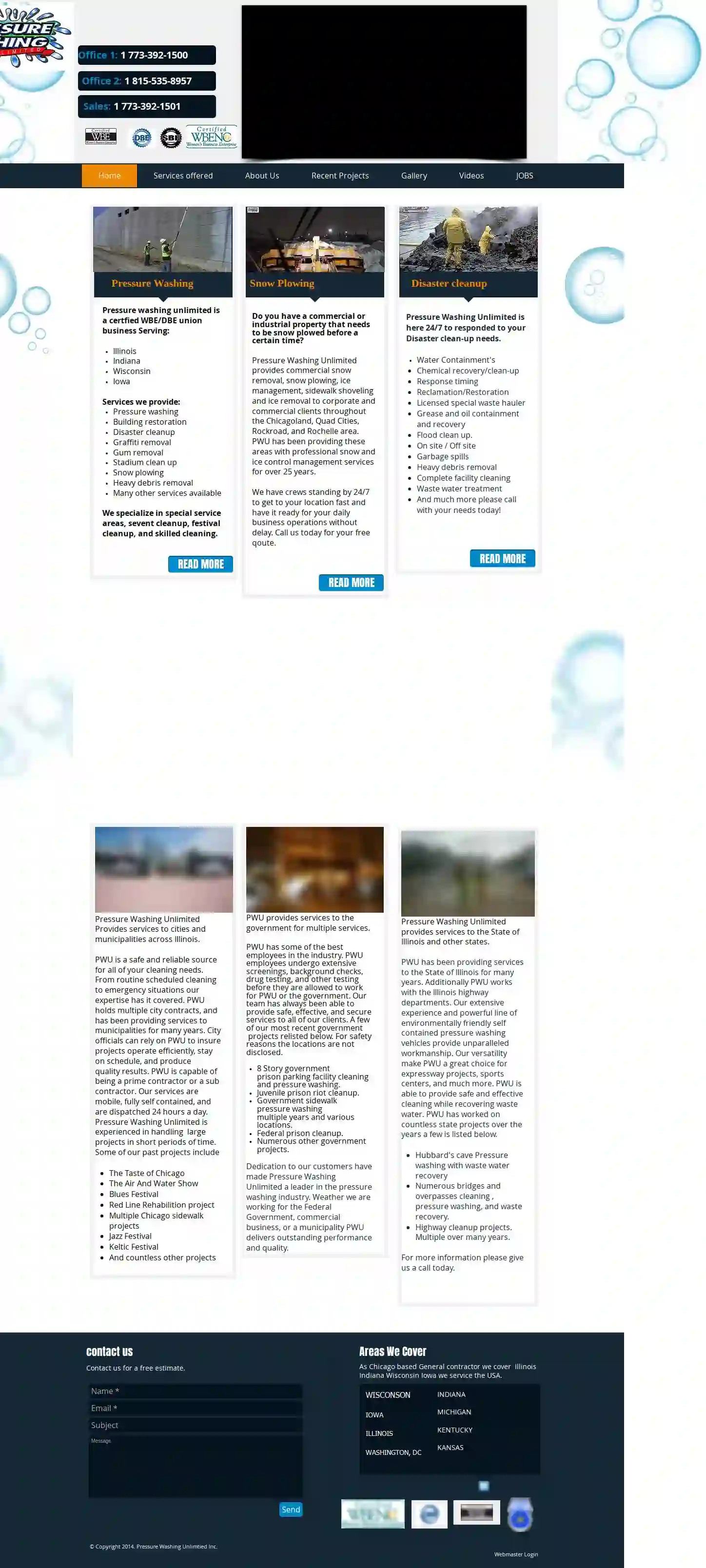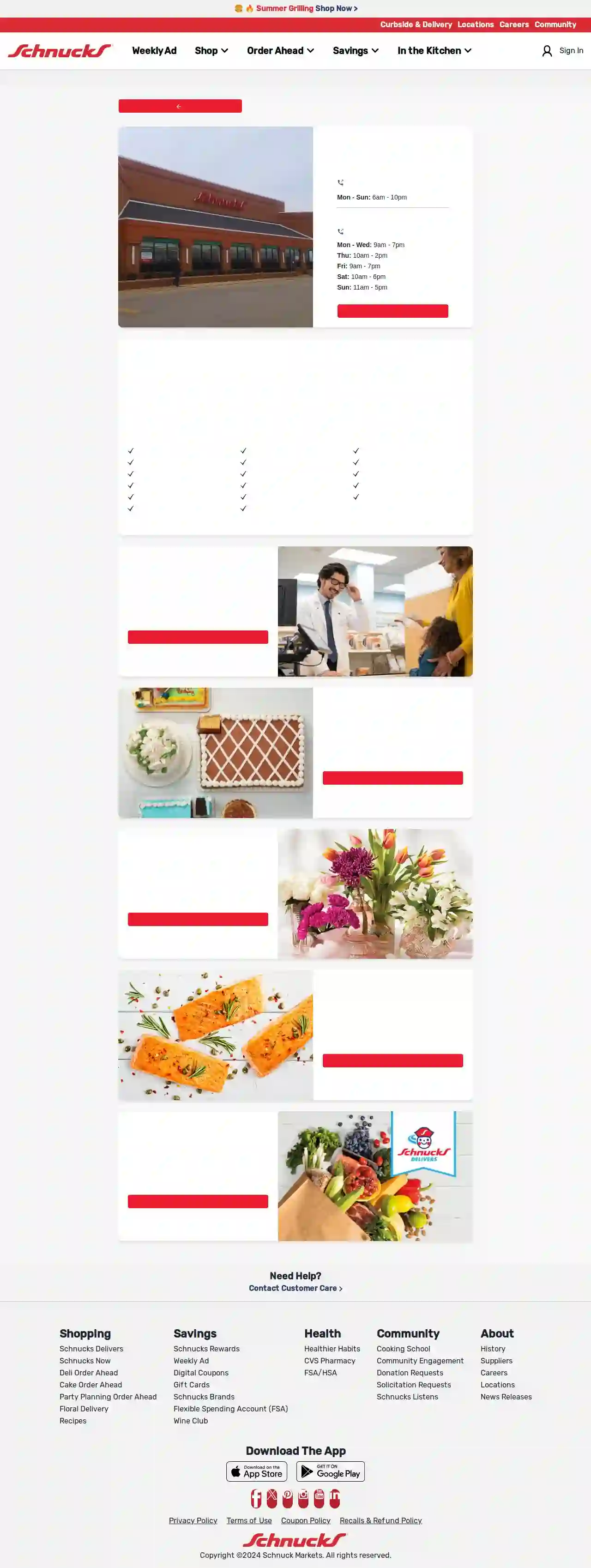Pressure Washing Creve Coeur
Top Exterior Cleaning in Creve Coeur
Get multiple Power Washing quotes for your project today! Compare profiles, reviews, accreditations, portfolio, etc... and choose the best offer.

Midwest Softwash and Pressure Wash
4.950 reviewsLerna, IL, 316 N County Rd 1320 E, 62440, USMidwest Softwash and Pressure Wash is a professional non-pressure roof and exterior washing and cleaning company. We have been practicing the art of softwashing dirty roofs and homes since 2010, and continue on today with our specialized equipment and cleaners. We are fully certified with The Roof Cleaning Institute of America, and undergo regular training to make sure we are always at the forefront of our industry. We offer a safe alternative to pressure washing, with cleaners that are fully eco-friendly and non-abrasive, but still highly effective. In fact all of our solutions are fully approved by ARMA (asphalt roofing manufacturer’s association) to be completely tailored and safe to the surfaces they are cleaning. We use an application method that allows for deep penetration to kill mold, mildew and other undesirables, leaving a sparkling beautiful clean in its wake. Increase your curb appeal, and renew the look of your home’s roof all without the damaging side effects of pressure washing.
- Services
- Why Us?
- Accreditations
- Our Team
- Testimonials
- Gallery
Get Quote
Splash Pressure Wash
56 reviewsThe Garland Building #3111, 111 N Wabash Suite 100, Chicago, 60602, USSplash Pressure Wash is a Chicago, Illinois based company specializing in cleaning all types of surfaces. They pride themselves on using the strongest, safest, and most effective chemicals available, which are industrial strength, water-based, non-flammable, biodegradable, and non-toxic. They also guarantee no residue is left behind, and their chemicals are free of phosphates, butyl, chlorinated solvents, and noxious or volatile vapors. Splash Pressure Wash offers a variety of services including industrial washing, commercial washing, building and house washing, specialty cleaning, post construction cleaning, roof washing, efflorescence removal, concrete, brick, and stone cleaning, patio and deck washing, bird abatement, environmental cleanup, rust removal, parking garage washing, graffiti removal, and composite and vinyl washing. They serve the Chicagoland area, Northwest Suburbs, South Suburbs, and anywhere in between.
- Services
- Why Us?
- Testimonials
- Gallery
Get Quote
Chicago Power Clean
51 reviews123 Main Street, Suite 100, Chicago, 60601, USWelcome to Chicago Power Clean, home of the simplest satisfaction guarantee in the business. We are a full service no hassle pressure washing company servicing all of Chicago and Metro Chicago. We use only the best equipment and techniques to make your homes and businesses shine. Our satisfaction guarantee is the simplest in the business. If you don’t like it, you don’t pay. It really is that easy, and no other company in the Chicagoland area can say that they have our level of commitment and pride in their work. Pressure washing in Chicago is not just ‘something we do,’ We are constantly researching new procedures and techniques to give you the best clean for your money. We are devoted to the business and your total satisfaction. Please take some time to learn about us and the many services that we provide. If you like what you see, give us a call at 847-963-8888. We look forward to hearing from you soon. Commercial Power Washing We offer professional commercial pressure washing in Chicago from awning cleaning and sidewalk cleaning to cleaning of your buildings brick and limestone. Industrial Power Washing We also offer complete industrial power washing from ware house walls and floors to any type of heavy equipment you may have. Residential Power Washing We not only power clean houses from top to bottom, we also offer patio, driveway, decking and fences.
- Services
- Why Us?
- Accreditations
- Our Team
- Testimonials
- Gallery
Get Quote
ChicagoLand SoftWash
516 reviewsArlington Heights, 60004, USChicagoLand SoftWash is a professional pressure washing company in Arlington Heights, IL, that specializes in residential and commercial pressure washing services. We are committed to making your environment a cleaner and safer place to be in. Our team of trained and qualified members goes above and beyond to provide you with reliable and affordable pressure washing solutions. Our soft wash technology and machinery were created by the ChicagoLand SoftWash team and went into use back in 2015 when officially certified and founded. In these 9 years, we have gained multitudes of knowledge every day of what is needed to protect our customers’ homes or businesses, while the whole time sanitizing and cleaning them to their original, if not newer, look by removing years of organisms such as fungi, bacteria, mold (including black mold), mildew, and lichen that grows on the exterior of these places. We understand that each property is unique and requires a customized cleaning solution. That's why we provide personalized pressure washing services to meet your specific needs. Whether it's a residential property or a commercial building, we have the expertise to deliver excellent results. At ChicagoLand SoftWash, we clean your property without causing any damages that straight pressure washing and power washing can do to your home or business's exterior. Our soft wash is a gentle cleaning process that uses eco-friendly solutions to kill and remove harmful organisms, leaving your property looking like new. Our team of experts is equipped with the latest tools and equipment to deliver safe and effective pressure washing services. We specialize in pressure washing Stucco, EIFS & Dryvit buildings, which are known for their delicate nature. Our pressure washing is gentle enough to clean these surfaces without causing any damage.
- Services
- Why Us?
- Our Team
- Testimonials
- Gallery
Get Quote
Precision Softwash and Pressure Washing
55 reviews12165 Oakcrest Dr, Huntley, 60142, USRestore the Beauty of Your Home With Our Exterior Cleaning Services! Precision Softwash and Pressure Washing is your trusted power washing company in Huntley, IL, and surrounding areas. Our team of experts is dedicated to providing top-notch exterior cleaning services for residential and commercial properties. We use state-of-the-art, commercial-grade equipment and eco-friendly cleaning solutions to ensure a thorough and efficient cleaning process. Our services include house washing, roof cleaning, window cleaning, gutter cleaning, concrete cleaning, and more. We pride ourselves on professionalism, trustworthiness, and customer-centric approach. Our team is always ready to help you achieve your goals and deliver the highest quality results. Contact us today to schedule your appointment and get a free estimate!
- Services
- Why Us?
- Testimonials
- Gallery
Get Quote
Loud Bros Floor Coatings, Pressure Washing & Deck Restoration
4.9165 reviews7 Finance Drive, Ste 1, 7 Finance Drive Ste 1, Bloomington, 61704, USLoud Bros Pressure Washing is a professional power washing and garage floor coating company based in Central Illinois. They specialize in providing top-notch exterior cleaning services for home and business properties, using eco-friendly chemicals to protect and enhance the longevity of paint. Their services include house washing, roof cleaning, garage floor coatings, storefront washing, and more. The company prides itself on its commitment to quality, professionalism, and customer satisfaction.
- Services
- Why Us?
- Accreditations
- Our Team
- Testimonials
- Gallery
Get Quote
Pressure Washing Unlimited/ PWU
52 reviewsSuite 100, Chicago, IL, 123 Main St, 60601, USPressure Washing Unlimited is a certified WBE/DBE union business that specializes in providing a variety of services including pressure washing, building restoration, disaster cleanup, graffiti removal, gum removal, stadium cleanup, snow plowing, and heavy debris removal. They serve Illinois, Indiana, Wisconsin, and Iowa.
- Services
- Why Us?
- Accreditations
- Our Team
- Testimonials
- Gallery
Get Quote
Schnucks Champaign
4.3109 N. Mattis Rd, Champaign, IL, 61821, USSchnucks Champaign is a grocery store located at 109 N. Mattis Rd, Champaign, IL 61821. It offers a variety of services including deli, meat, dairy, bakery, floral, grocery, produce, seafood, pharmacy, frozen food, blood pressure screening, Redbox, wireless solutions, Boar's Head, CoinMax location, Rug Doctor, Sugarfire Smoke House, and more. The store is open from 6am to 10pm, Monday through Sunday. The pharmacy is open from 9am to 7pm, Monday through Friday, 10am to 6pm on Saturday, and 11am to 5pm on Sunday. The store manager is Andy Jayne, and the co-manager is Phillip Green.
- Services
- Why Us?
- Accreditations
- Our Team
- Testimonials
- Gallery
Get Quote
Quality Blast
56 reviewsDewitt, IL, 12247 Solomon Rd, 61735, USQuality Blast is Bloomington's go-to professional pressure washer! We offer premium pressure washing and soft washing services for homeowners and businesses. Our team has extensive experience and knowledge, plus the best equipment for the job. We work closely with property owners to discuss and create a personalized cleaning plan that will fit the needs of their property.
- Services
- Why Us?
- Accreditations
- Our Team
- Testimonials
- Gallery
Get Quote- Pr
Premier Pressure Wash'N
518 reviews1000 W. 103rd St., Chicago, IL 60630, 60630, USPremier Pressure Washing is a locally owned and operated business serving the greater Chicago area. We specialize in residential and commercial pressure washing services, including house washing, deck cleaning, fence cleaning, and more. Our team of experienced professionals uses the latest equipment and techniques to deliver exceptional results. We are committed to providing our customers with high-quality service at competitive prices.
- Services
- Why Us?
- Gallery
Get Quote
Over 60,241+ Janitorial Companies onboarded
Our cleaning service providers operate in Creve Coeur & surroundings!
CleaningMatch has curated and vetted Top Janitorial Companies arround Creve Coeur. Find a top & trustworthy business today.
Frequently Asked Questions About Pressure Washing
- Reputation and Reviews: Check online reviews and ask for referrals to gauge the company's reputation and customer satisfaction.
- Experience and Expertise: Look for a company with a proven track record and experience in pressure washing various surfaces.
- Licensing and Insurance: Ensure the company is licensed and insured to protect you from liability.
- Equipment and Techniques: Inquire about the company's equipment and techniques to ensure they use appropriate pressure levels and cleaning solutions.
- Quotes and Pricing: Obtain detailed quotes that outline all services and costs.
- Professionalism and Communication: Choose a company that is responsive, communicative, and professional.
- Cover or Shield Plants: Before pressure washing, cover or shield delicate plants and landscaping with tarps, plastic sheeting, or painter's tape to protect them from water spray and chemicals.
- Use Lower Pressure Settings: If pressure washing near plants, use lower pressure settings and avoid directing the spray directly at them.
- Rinse Plants with Water: After pressure washing, rinse plants thoroughly with plain water to dilute any chemicals that may have landed on them.
- Choose Plant-Safe Cleaning Solutions: If using cleaning solutions, opt for environmentally friendly or plant-safe options whenever possible.
- Pressure Washing: For hard surfaces like concrete, brick, or decks, pressure washing can effectively remove mold and mildew. Use a cleaning solution containing bleach or mildewcide for optimal results.
- Soft Washing: For delicate surfaces like roofs or siding, soft washing is the preferred method for mold and mildew removal. Soft washing uses low-pressure water and specialized cleaning solutions to gently remove mold and mildew without damaging the surface.
- Prevention: After cleaning, take steps to prevent future mold and mildew growth by addressing moisture issues, such as fixing leaks, improving ventilation, and trimming vegetation that creates shade and traps moisture.
- Size of the Area: Larger areas generally cost more to pressure wash than smaller ones.
- Type of Surface: Different surfaces require different pressure levels and cleaning solutions, which can affect pricing.
- Condition of the Surface: Heavily soiled or stained surfaces may require more time and effort to clean, impacting cost.
- Accessibility: Difficult-to-reach areas may require specialized equipment and increase costs.
- Additional Services: Services like pre-treating stains, applying protective coatings, or mold removal may incur additional charges.
What should I look for in a pressure washing company?
A reputable pressure washing company will prioritize safety, use appropriate cleaning methods, and provide excellent customer service.
Can pressure washing damage my plants?
Taking these precautions minimizes the risk of damage to your plants and landscaping during pressure washing.
Can pressure washing remove mold and mildew?
If you have extensive or persistent mold and mildew problems, consult with a professional pressure washing company or a mold remediation specialist.
How much does pressure washing cost?
To get accurate pricing, request quotes from multiple pressure washing companies. Provide details about the size and type of surface, its condition, and any additional services you require.
What should I look for in a pressure washing company?
- Reputation and Reviews: Check online reviews and ask for referrals to gauge the company's reputation and customer satisfaction.
- Experience and Expertise: Look for a company with a proven track record and experience in pressure washing various surfaces.
- Licensing and Insurance: Ensure the company is licensed and insured to protect you from liability.
- Equipment and Techniques: Inquire about the company's equipment and techniques to ensure they use appropriate pressure levels and cleaning solutions.
- Quotes and Pricing: Obtain detailed quotes that outline all services and costs.
- Professionalism and Communication: Choose a company that is responsive, communicative, and professional.
A reputable pressure washing company will prioritize safety, use appropriate cleaning methods, and provide excellent customer service.
Can pressure washing damage my plants?
- Cover or Shield Plants: Before pressure washing, cover or shield delicate plants and landscaping with tarps, plastic sheeting, or painter's tape to protect them from water spray and chemicals.
- Use Lower Pressure Settings: If pressure washing near plants, use lower pressure settings and avoid directing the spray directly at them.
- Rinse Plants with Water: After pressure washing, rinse plants thoroughly with plain water to dilute any chemicals that may have landed on them.
- Choose Plant-Safe Cleaning Solutions: If using cleaning solutions, opt for environmentally friendly or plant-safe options whenever possible.
Taking these precautions minimizes the risk of damage to your plants and landscaping during pressure washing.
Can pressure washing remove mold and mildew?
- Pressure Washing: For hard surfaces like concrete, brick, or decks, pressure washing can effectively remove mold and mildew. Use a cleaning solution containing bleach or mildewcide for optimal results.
- Soft Washing: For delicate surfaces like roofs or siding, soft washing is the preferred method for mold and mildew removal. Soft washing uses low-pressure water and specialized cleaning solutions to gently remove mold and mildew without damaging the surface.
- Prevention: After cleaning, take steps to prevent future mold and mildew growth by addressing moisture issues, such as fixing leaks, improving ventilation, and trimming vegetation that creates shade and traps moisture.
If you have extensive or persistent mold and mildew problems, consult with a professional pressure washing company or a mold remediation specialist.
How much does pressure washing cost?
- Size of the Area: Larger areas generally cost more to pressure wash than smaller ones.
- Type of Surface: Different surfaces require different pressure levels and cleaning solutions, which can affect pricing.
- Condition of the Surface: Heavily soiled or stained surfaces may require more time and effort to clean, impacting cost.
- Accessibility: Difficult-to-reach areas may require specialized equipment and increase costs.
- Additional Services: Services like pre-treating stains, applying protective coatings, or mold removal may incur additional charges.
To get accurate pricing, request quotes from multiple pressure washing companies. Provide details about the size and type of surface, its condition, and any additional services you require.